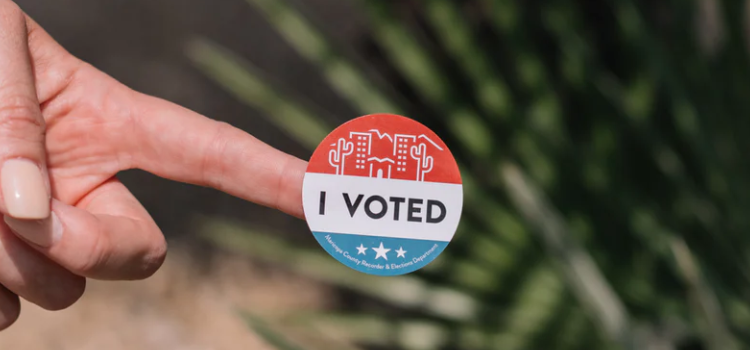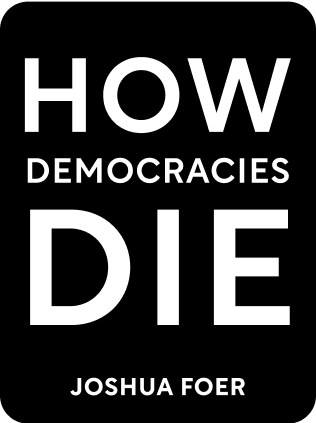

This article is an excerpt from the Shortform book guide to "How Democracies Die" by Steven Levitsky and Daniel Ziblatt. Shortform has the world's best summaries and analyses of books you should be reading.
Like this article? Sign up for a free trial here .
Are you looking look for quotes from How Democracies Die? What do these quotes mean and how can they encourage you to talk about democracy?
How Democracies Die is about how authoritarians come to power, and how the U.S. can prevent having this fate. These five quotes can help explain why it’s so important to be pro-democracy and preserve democratic principles.
Keep reading for five thought-provoking How Democracies Die quotes.
5 Quotes From How Democracies Die
These How Democracies Die quotes talk about some of the major parts of the book such as the rise of authoritarians, democratic norms, and how democracy can prevail. Read these five thought-provoking quotes to help you think about the major themes in the book.
“One of the great ironies of how democracies die is that the very defense of democracy is often used as a pretext for its subversion. Would-be autocrats often use economic crises, natural disasters, and especially security threats—wars, armed insurgencies, or terrorist attacks—to justify antidemocratic measures.”
If we want the political system to reject authoritarians, we need to be able to identify them first. What are some of the warning signs of an anti-democratic figure or movement? The political scientist Juan Linz identified four warning signs of authoritarianism. They single out politicians who:
- Reject the generally accepted rules of democratic competition. A good example of this would be a leader who refuses to accept the results of democratic elections if they are unfavorable to him or his movement.
- Refuse to accept the legitimacy of their democratic opponents. This can be seen in politicians who, with no evidence, accuse their political competitors of being traitors or criminals.
- Endorse or encourage violence. These are leaders who either turn a blind eye to, or actively encourage, acts of violence or sabotage by their political supporters against their political opponents.
- Express a willingness to crack down on civil liberties. A good example of this would be a politician who promises punitive financial or legal action against oppositional media.
“Two basic norms have preserved America’s checks and balances in ways we have come to take for granted: mutual toleration, or the understanding that competing parties accept one another as legitimate rivals, and forbearance, or the idea that politicians should exercise restraint in deploying their institutional prerogatives.”
Given this brief overview of the ups and downs of democratic norms throughout American political history, it makes sense to look at how the political system is supposed to function. The US Constitution established a series of checks and balances across the three branches of government. The checks and balances are meant to operate regardless of which party happens to control which branch.
Each branch of government has a role to play in upholding these norms. By the same token, each branch has the ability to violate them if it so chooses. Let’s look briefly at norms within the executive, legislative, and judicial branches.
“The drift into authoritarianism doesn’t always set off alarm bells. Citizens are often slow to realize that their democracy is being dismantled even as it happens before their eyes.”
Countries avoid succumbing to authoritarian parties through strong democratic norms. Norms are the unwritten rules that govern political conduct. They are guardrails that prevent political competition from getting too intense or the stakes of elections from getting too high, thus turning every election contest into a winner-take-all battle that justifies winning at any cost. There are two norms that deserve special consideration—mutual toleration and institutional forbearance.
“In our view, the idea that Democrats should “fight like Republicans” is misguided. First of all, evidence from other countries suggests that such a strategy often plays directly into the hands of authoritarians.”
This polarization of the parties, however, is about far more than traditional disagreements over political issues. Polarization reflects deeper and more fundamental divisions in society, like race, religion, sexuality, and culture. These are not new forms of division by any means, but never before have they been folded so neatly into the structure of the two-party system. Partisan affiliation increasingly encompasses these other, more emotionally resonant forms of identity.
The Republican Party has become overwhelmingly the party of white Christians. The Democrats, meanwhile, are increasingly the party of secular, urban non-whites. Thus, one’s political identity is about far more than just beliefs about public taxing and spending policy—it is about one’s core identity and set of values. This makes the parties more and more unrecognizable to one another—and less and less willing to extend mutual respect and institutional forbearance to one another.
“Authoritarian politicians cast their rivals as criminal, subversive, unpatriotic, or a threat to national security or the existing way of life.”
Trump attempted to sideline his opponents through his attacks on the mainstream media. Trump routinely labelled mainstream media, which tended to give unfavorable coverage to his administration, as “fake news.” He argued that the media was inflexibly biased against him and that voters should disregard what outlets like CNN, the Washington Post, and the New York Times reported about his administration.
He viewed the media as his opponents and saw launching these attacks on them as a way to discredit them—and signal to his supporters that he was the only source of truth. This conditions GOP voters to live in an alternative-facts universe, while raising support for various forms of media repression among these same voters.

———End of Preview———
Like what you just read? Read the rest of the world's best book summary and analysis of Steven Levitsky and Daniel Ziblatt's "How Democracies Die" at Shortform .
Here's what you'll find in our full How Democracies Die summary :
- How shared norms are essential for preserving democracy
- Why the Trump presidency threatened those shared norms
- Why democracy goes beyond individual leaders and parties and must be a shared enterprise among committed individuals







For quite awhile I’ve been searching for an “essay” published in the 1930’s (I believe?) that details a number of steps taken to ensure the demise of a democracy(how to destroy a democracy). I cannot recall the name of the author nor what periodical it was from. Are you familiar with the article to which I’m referring?